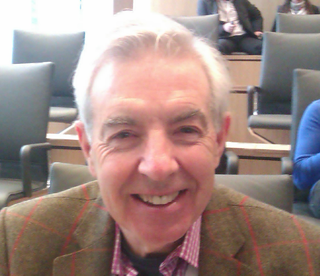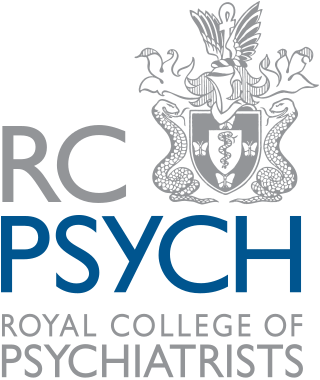
The Maudsley Hospital is a British psychiatric hospital in south London. The Maudsley is the largest mental health training institution in the UK. It is part of South London and Maudsley NHS Foundation Trust, and works in partnership with the Institute of Psychiatry, King's College London. The hospital was one of the originating institutions in producing the Maudsley Prescribing Guidelines. It is part of the King's Health Partners academic health science centre and the National Institute for Health and Care Research (NIHR) Biomedical Research Centre for Mental Health.

Sir Robin MacGregor Murray FRS is a British psychiatrist, Professor of Psychiatric Research at the Institute of Psychiatry, King's College London. He has treated patients with schizophrenia and bipolar illness referred to the National Psychosis Unit of the South London and Maudsley NHS Trust because they fail to respond to treatment, or cannot get appropriate treatment, locally; he sees patients privately if they are unable to obtain an NHS referral.
Liaison psychiatry, also known as consultative psychiatry or consultation-liaison psychiatry, is the branch of psychiatry that specialises in the interface between general medicine/pediatrics and psychiatry, usually taking place in a hospital or medical setting. The role of the consultation-liaison psychiatrist is to see patients with comorbid medical conditions at the request of the treating medical or surgical consultant or team. Consultation-liaison psychiatry has areas of overlap with other disciplines including psychosomatic medicine, health psychology and neuropsychiatry.

The Royal College of Psychiatrists is the main professional organisation of psychiatrists in the United Kingdom, and is responsible for representing psychiatrists, for psychiatric research and for providing public information about mental health problems. The college provides advice to those responsible for training and certifying psychiatrists in the UK.
The Caldicott Committee's December 1997 Report on the Review of Patient-Identifiable Information, usually referred to as the Caldicott Report, identified weaknesses in the way parts of NHS handled confidential patient data. The report made several recommendations, one of which was the appointment of Caldicott guardians, members of staff with a responsibility to ensure that patient data are kept secure:
Recommendation 3: A senior person should be nominated in each NHS organisation, including the Department of Health and associated agencies, to act as a "guardian". The "guardian" should normally be a senior health professional or be closely supported by such a person. The NHS IM&T Security Manual requires each organisation to designate a senior medical officer to oversee all procedures affecting access to person-identifiable health data. This role and that of the "guardian" may be combined, providing there is no conflict of interest. The Department of Health should take the development of this role forward in partnership with interested parties.
The Caldicott Committee's Report on the Review of Patient-Identifiable Information, usually referred to as the Caldicott Report, was a review commissioned in 1997 by the Chief Medical Officer of England due to increasing worries concerning the use of patient information in the National Health Service (NHS) in England and Wales and the need to avoid the undermining of confidentiality because of the development of information technology in the NHS, and its ability to propagate information concerning patients in a rapid and extensive way.

South London and Maudsley NHS Foundation Trust, also known as SLaM, is an NHS foundation trust based in London, England, which specialises in mental health. It comprises four psychiatric hospitals, the Ladywell Unit based at University Hospital Lewisham, and over 100 community sites and 300 clinical teams. SLaM forms part of the institutions that make up King's Health Partners, an academic health science centre.

The Academy of Medical Royal Colleges (AoMRC) is the coordinating body for the United Kingdom and Ireland's 24 Medical Royal Colleges and Faculties. It ensures that patients are safely and properly cared for by setting standards for the way doctors are educated, trained and monitored throughout their careers. The Academy Council meet regularly to agree direction. The Council comprises the Presidents of the member Colleges and Faculties and four coopted council members.

Dame Anne Marie Rafferty FRCN is a British nurse, academic and researcher. She is the professor of nursing policy and the former dean of the Florence Nightingale Faculty of Nursing, Midwifery and Palliative Care at King's College London. She served as President of the Royal College of Nursing from 2019 to 2021. She was nominated for a life peerage on 20 December 2024.

Sir Simon Charles Wessely is a British psychiatrist. He is Regius Professor of Psychiatry at the Institute of Psychiatry, King's College London and head of its department of psychological medicine, vice dean for academic psychiatry, teaching and training at the Institute of Psychiatry, as well as Director of the King's Centre for Military Health Research. He is also honorary consultant psychiatrist at King's College Hospital and the Maudsley Hospital, as well as civilian consultant advisor in psychiatry to the British Army. He was knighted in the 2013 New Year Honours for services to military healthcare and to psychological medicine. From 2014 to 2017, he was the elected president of the Royal College of Psychiatrists and then became the first psychiatrist to be elected as President of the Royal Society of Medicine in 200 years.
The National Information Governance Board for Health and Social Care (NIGB) advised the United Kingdom government on information governance between 2008 and 2013.

Dame Clare Mary Louise Francis Gerada, Lady Wessely is a London-based general practitioner who is a former President of the Royal College of General Practitioners (RCGP) and a former chairperson of the RCGP Council (2010–2013). She has professional interests in mental health, substance misuse, and gambling problems.
Felice Lieh–Mak is a Hong Kong physician, psychiatrist, academician, editor and retired civil servant, and emeritus professor at the University of Hong Kong.
Dinesh Kumar Makhan Lal Bhugra is a professor of mental health and diversity at the Institute of Psychiatry at King's College London. He is an honorary consultant psychiatrist at the South London and Maudsley NHS Foundation Trust and is former president of the Royal College of Psychiatrists. Bhugra was the president of the World Psychiatric Association (WPA) between 2014 and 2017 and the President of the British Medical Association in 2018-2019.
Amanda Ramirez is Professor of Liaison Psychiatry, director of the Promoting Early Presentation Group at King's College London, director of Informed Choice about Cancer Screening at King's Health Partners and National Clinical Lead for Cancer Patient Information, National Cancer Action Team, now part of NHS Improving Quality.
Direct care is the care of an identified patient by an identified clinical professional, used throughout the National Health Service in the United Kingdom.
Dame Susan Mary Bailey is a British psychiatrist and academic who specialises in children's mental health. Since 2004, she has been Professor of Child Mental Health at the University of Central Lancashire. From 2011 to 2014, she was President of the Royal College of Psychiatrists. Since January 2015, she has been Chair of the Academy of Medical Royal Colleges.
The National Data Guardian for Health and Social Care is an independent, non-regulatory, advice giving body in England sponsored by the Department of Health and Social Care. Dame Fiona Caldicott had held the position on a non-statutory basis since its inception in November 2014. She was appointed the first statutory National Data Guardian in March 2019 following the introduction of the Health and Social Care Act 2018, and remained in post until her death in February 2021. Dr Nicola Byrne was appointed to the role in March 2021 by the Secretary of State for Health and Social Care.
Shubulade Smith, also known as Lade Smith is a British academic and consultant psychiatrist at the South London and Maudsley NHS Foundation Trust (SLaM). She is a senior lecturer at King's College, London and Clinical Director at the NCCMH and forensic services at SLaM, and is currently serving as the first black President of the Royal College of Psychiatrists.
Wendy Katherine Burn is a Consultant in Old Age Psychiatry. She was President of the Royal College of Psychiatrists from 2017 to 2020.








